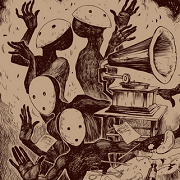(Thread IKs:
dead gay comedy forums)
|
BillsPhoenix posted:Ok so... I'm not really sure there's consensus on the inflating an items price. there's lots of price changes on the micro scale that can indeed be chalked up to individual greed, bargaining savvy, cheating, etc., and those can in turn be understood as a de facto theft or at least a move in a zero sum game where one haggler's gain is another haggler's loss. the question is, why can't a devious and greedy capitalist mark their product up two, three, five, ten times as much as they do? and the answer is the law of value. swindling happens in both directions but it's not the ultimate source of profit BillsPhoenix posted:Past few years in the US, many different food manufacturers have artificially increased their pricing because they're greedy. There's implicit collision and evidence of explicit collusion to allow this. i just don't think "greedy" makes any sense here. they're doing it to maximize profits, which is their job, in the face of a falling rate of profit, which is just endogenous to the market. they ARE doing it through collusion and arbitrary price raises rather than through any kind of productivity increase or other competitive advantage, but on the other hand in a "truly" free market they'd be able to just merge into a single grocery monopoly and perform the exact same kind of extortion without having to be sneaky about it, so who cares, really but to reiterate, a lot of loving around does go into setting prices, and does amount to a de facto theft from one party by the other (and this can happen in both directions). the important thing is that this happens on top of regular capitalist profits, which, as marx shows, exist even if we assume strictly fair exchange between all participants
|
|
|
|

|
| # ? Apr 30, 2024 04:41 |
|
marx also wrote about the tendency toward monopoly, and interestingly, lenin wrote about what happens when you get a lot of monopoly action going within an economy…
|
|
|
|
Orange Devil posted:Yeah for all the hubbub about refugees and Muslims and brown people coming to Replace Us, or whatever, the actual mass influx of labour used to crush the domestic working class in Western Europe came and continues to come from Eastern Europe through Schengen and the EU. In that sense Brexit made a lot more sense as a response than giving Frontex carte blanche to turn the Med into a graveyard. Idk, is this what primary contradictions are about? Because this whole thing is clearly one of those "the house always wins" topics. It's true that immigration absolves capitalists of the need to pay replacement level wages, but it's also true that the backlash against immigration makes it easier to compress wages for immigrants in particular, which in the end compresses all wages and also builds a repression apparatus that will always be turned against the working class in total.
|
|
|
|
Ferrinus posted:but to reiterate, a lot of loving around does go into setting prices, and does amount to a de facto theft from one party by the other (and this can happen in both directions). the important thing is that this happens on top of regular capitalist profits, which, as marx shows, exist even if we assume strictly fair exchange between all participants Another angle to help along with this theme: luxury items and conspicuous consumption. A good question for the initiated isn't why a Hermès bag is so expensive, but why they stopped there. Hermès and other such brands make a whole spectacle of telling the world how their products are made by exceptional artisans and blablabla, which is just price tag laundering. Such items, as items whose intended use-value is in the consumption of luxury and very little in the actual usefulness of the item, are priced extremely so for that purpose: they serve much more as speculative assets than an actual physical good. Therefore, they are priced according to how much their favored clientele is willing to pay for the experience of privileged consumption - and it is the added value of that experience that the brand-owner robs *as well* of the entire productive chain.
|
|
|
|
i know someone who makes bags for hermes. she makes barely above the minimum wage.
|
|
|
|
I'm curious on the difference noted by this footnote. i read the before and after and I don't really see why it requires a note at all. Is this a matter of some controversy and if so,what over?quote:17. Note by the Institute of Marxism-Leninism in the Russian edition. — In his letter of November 28, 1878, to N. F. Danielson (Nikolai-on) Marx proposed that this sentence be corrected to read as follows: “And, as a matter of fact, the value of each single yard is but the materialised form of a part of the social labour expended on the whole number of yards.” An analogous correction was made in a copy of the second German edition of the first volume of “Capital” belonging to Marx; however, not in his handwriting. quote:And as a matter of fact, the value also of each single yard is but the materialised form of the same definite and socially fixed quantity of homogeneous human labour. [17]
|
|
|
|
tristeham posted:i know someone who makes bags for hermes. she makes barely above the minimum wage. yup, that's why it's laundering (lying over process of production to fake an excuse about the price)
|
|
|
|
hubris.height posted:I'm curious on the difference noted by this footnote. i read the before and after and I don't really see why it requires a note at all. Is this a matter of some controversy and if so,what over? they state the same thing. I think the corrected version is easier to parse, hence why it was written The Voice of Labor has issued a correction as of 02:04 on Apr 6, 2024 |
|
|
|
tristeham posted:i know someone who makes bags for hermes. she makes barely above the minimum wage. less extreme case but i'll never forget a friend of mine in the Anchor Brewing Union telling me that an hour of loading kegs of beer on a truck paid them enough to buy one (1) beer at a Giants game
|
|
|
|
BillsPhoenix posted:If you told a random American that price gouging wasn't possible... I'm not sure where you're getting this, no one's saying that price gouging isn't possible, just that it isn't the fundamental source of profit. Even in the most basic, abstract sense, stealing, monopolism, out-bargaining, or out-predicting one's rivals, within a market, can be a source of a profit, but by definition they can't be the source of profit in that market in general, because they are zero sum. Pomeroy has issued a correction as of 04:15 on Apr 6, 2024 |
|
|
|
the trick is using whole the economy in your economics examples is cheating. instead of talking of systems or averages and invoking time, you have to slice everrything down to an instaneeous transaction between at most two parties after all we know this method of perfectly spherical instantanteous relation works well to describe everything in the world, like how an airplane flies through the air one molecule at a time or how neurons function create cognition or how your car starts or well, anything at all!
|
|
|
|
yah one of the cool things about marx is he managed to prove “the economy” is a real, material thing with thermodynamic properties like socially necessary labor time and the tendency of the rate of profit to fall. like air molecules in a room, once I realized capitalism was an analogous object, a lot of the variations in pay or price suddenly made a lot more sense. like of course there are local variations, that’s the whole basis of statistical properties.
|
|
|
|
hubris.height posted:I'm curious on the difference noted by this footnote. i read the before and after and I don't really see why it requires a note at all. Is this a matter of some controversy and if so,what over? I'd guess the "socially fixed" bit may be misinterpreted in some ways, like saying the share of social labor expended in this specific process is not something that can change. But that's just a guess, really.
|
|
|
|
BillsPhoenix posted:Or... Marx used use value and exchange value to point out increasing or decreasing a price has no impact on the value of a commodity. Ferrinus posted:the machine seller can't just charge $750 because he's "greedy". if greed was actually what made capitalism go, he could charge $800 or $1000 or whatever instead, right? one of my favorite jokes goes like this: a man is wandering an open air market, and finds a stall with a single seller and a sign that reads "ballpoint pens: $10,000". the man asks, why are you selling your pens for that much? the merchant responds, this way, i only have to sell one! Fat-Lip-Sum-41.mp3 posted:If you read. the loving. book. you will find that Marx eliminates that nonsense in order to examine how capitalism functions at the essential level. Supply and demand are always equal in Capital, because flux in Supply/Demand were invoked as explanations for why prices are this or that. good explainations, bill, theyre long but i promise worth reading
|
|
|
|
interesting chain of responses to gradenko_2000 but this is the answergenericnick posted:Idk, is this what primary contradictions are about? Because this whole thing is clearly one of those "the house always wins" topics. It's true that immigration absolves capitalists of the need to pay replacement level wages, but it's also true that the backlash against immigration makes it easier to compress wages for immigrants in particular, which in the end compresses all wages and also builds a repression apparatus that will always be turned against the working class in total. 
|
|
|
|
Thanks for all the repliesCuttlefush posted:I wouldn't say it like that, but the answers to what I think you're asking are yes. volume 1 does discuss this and how things get averaged. it's all over, but chapter 6, 13, 19 (https://www.marxists.org/archive/marx/works/1867-c1/ch06.htm, https://www.marxists.org/archive/marx/works/1867-c1/ch13.htm, and https://www.marxists.org/archive/marx/works/1867-c1/ch19.htm) most directly apply i think. But this in particular - I broke out the Vol 1 paperback and read through Chapter 6 and the writing was so crisp and cutting. It was cool to see Marx go through the explanation in an even more basic, yet also more comprehensive fashion than what I was trying to get at.
|
|
|
|
This isn't really a marxist theory question, but I don't know where else to ask so. What do people think about "all power to the soviets"? As in, the worker-soldier-peasant councils? As a result of the Civil War their self-organizing nature kind of got hollowed out and the USSR went on to lean more heavily into a top-down state beauracracy under the vanguard party. Was that a good idea? Wouldn't it have been ideal to go back to real soviet power after the defeat of the Whites? Or would that have made the state too unstable?
|
|
|
|
AFancyQuestionMark posted:This isn't really a marxist theory question, but I don't know where else to ask so. What do people think about "all power to the soviets"? As in, the worker-soldier-peasant councils? As a result of the Civil War their self-organizing nature kind of got hollowed out and the USSR went on to lean more heavily into a top-down state beauracracy under the vanguard party. After the defeat of the whites, came the loving nazies. After defeat of the nazies, came United States of America and cold war. Before Cold War could have been won, reactionary elements had already grabbed the power. I think Stalin just died at the worst possible moment, and had he lived longer and had he himself carried on decentralizing the power to soviets e.g. councils, then yeah it may have been better
|
|
|
|
The Alchemist posted:After the defeat of the whites, came the loving nazies. After defeat of the nazies, came United States of America and cold war. Before Cold War could have been won, reactionary elements had already grabbed the power. I think there was a period in the 20s-early 30s where it could have easily been done. I am asking whether that would have been a good idea or not, and whether that's a good form of government in general or not.
|
|
|
|
AFancyQuestionMark posted:I think there was a period in the 20s-early 30s where it could have easily been done. I am asking whether that would have been a good idea or not, and whether that's a good form of government in general or not. Its not good when there are external threats, but its good for peace and prosperity times
|
|
|
|
The Alchemist posted:Its not good when there are external threats, but its good for peace and prosperity times I mean, is it really? What problems is it going to solve?
|
|
|
|
The problems it's supposed to solve are worker alienation from government and excessive beurocratism. There is a reason Lenin once called the soviets "the purest form of democracy ever to exist". I am asking the people of this thread, which are usually familiar with scholarship and stuff, if this is something that's been studied/discussed.
|
|
|
|
AFancyQuestionMark posted:The problems it's supposed to solve are worker alienation from government and excessive beurocratism. There is a reason Lenin once called the soviets "the purest form of democracy ever to exist". I'm also v interested in this topic so +1 to this
|
|
|
|
AFancyQuestionMark posted:The problems it's supposed to solve are worker alienation from government and excessive beurocratism. There is a reason Lenin once called the soviets "the purest form of democracy ever to exist". If you look at say Cuba, they are incredibly democratic in practice I don't think you can underestimate the effect of a brutal civil war egged on by the west plus a nazi invasion of the west (also cultured by the west), the surprising thing was that the Soviet society didn't collapse immediately. usually that's what happens when a society suddenly loses 13% of the population. and don't forget the selection bias here, everyone who would be willing to do hard and boring leadership in the army was possibly going to be faced with times where they could die to save other people. who do think was left after all this? large parts of the organically grown leadership was in graves. those people are still important in a democratic system, you want and desire people wiling to do organizational work as a specialized task, just like any other scut work. and the organizational experience the next generation was getting was the army which they previously tried and failed to make democratic and effective. so there could have been better outcomes, but the conditions were not at all favorable
|
|
|
|
Mandel Brotset posted:yah one of the cool things about marx is he managed to prove “the economy” is a real, material thing with thermodynamic properties like socially necessary labor time and the tendency of the rate of profit to fall. like air molecules in a room, once I realized capitalism was an analogous object, a lot of the variations in pay or price suddenly made a lot more sense. like of course there are local variations, that’s the whole basis of statistical properties. agreed imo this is the key to Jevons paradox, all actually occuring economic activity must be thermodynamically favored, else it would not occur
|
|
|
|
lol halp I don't understand averages over time or punctuated equilibrium or the absurdity of change in a system where existence is proof of maximal adaptation
|
|
|
|
soviet democracy involved constant voting and interchange that bounced up and down from the capstone "supreme soviet" to the individual village level, so i don't think there's actually a conflict between all power to the soviets on one hand and a centralized bureaucracy on the other. if you want to do national projects you need a national command and control system
|
|
|
|
Back to marx. I think we've at a bit of alignment on sources of value finally? Use value - we've covered this a lot, does an item have a use. No $ assigned, it either has a use or doesn't. Labor value - value generating labor. Surplus labor is the value not paid to the worker and exploited by the capitalist benefactor. No other form of labor value exists. This can be assigned $ both for surplus and what the worker receives. Exchange value. Items that have a use value have an exchange value that equals the labor value (as defined above) and raw material value. And that's it. This all works logically, can scale down to a single person (Robinson Curisoe) or scale up up to a whole economy. No form of value is unaccounted for.
|
|
|
|
"raw material value"
|
|
|
|
Raw materials have an exchange value equal to the value generating labor used to extract and get the raw materials to a marketplace. The labor consists of both paid to the worker and surplus value exploited from the worker. Better?
|
|
|
|
what have you been reading since last time bp
|
|
|
|
Mostly an accounting textbook. A behavioral science paper about recency bias and grouping. And all the wonderful posts here, though I completely ignored the tangent. I also rough drafted my last post, it actually is high effort 😞 I think I've covered all forms of value?
|
|
|
|
reading?
|
|
|
|
|
Brain Candy posted:If you look at say Cuba, they are incredibly democratic in practice The bureaucratic quagmire was also a consequence of the immediate realities of the Revolution, the Intervention and Civil War (and the general revolutionary conflicts). The Bolsheviks were handling existential risks that didn't afford the possibility for a thorough demolition and reconstruction of the tsarist state: much of the greater Soviet government was a takeover of that existing structure and prosecuting officials and nobles that were reactionary or historically adversarial to the popular interest, while offering the possibility to the immediately less problematic people to nominally join the party or just doing civil service. In places where the soviets managed to hold out and establish local government, they were the spearhead of the land conflicts by going out and fighting aristocrats and kulaks well over the Civil War, for example. So far from what I have read and came across, there's very little notion in our general view from the present of the difficulties of direct executive capacity the revolutionary government actually had: the impression given in most of the reading is that once Lenin sits in the chair, it is like a strategy game event and the buttons are available to do whatever he wanted. The reality of the circumstances was that the Soviet government had to battle from its major centers of Petrograd and Moscow into the countryside to link up with places that formed soviets while building new and properly soviet structures into the bureaucracy. SOVNARKOM was a monumental success in that regard, given the adversities faced, as it created a central executive authority that was able to do incredible feats of public administration, military organization and coordination, revolutionary construction and of the new political reality from the moment it popped up, but that was sustained by War Communism and that had a clear political threshold of tolerance. The new political structures would require a comprehensive build-up of the CPSU, to form a new roster for the political administration and move out the remainder of the tsarist state - it seems to me that Lenin was very likely to succeed in that task, but he got shot and then had the strokes...
|
|
|
|
BillsPhoenix posted:And that's it. This all works logically, can scale down to a single person (Robinson Curisoe) or scale up up to a whole economy. Funny you should bring that up, Marx has some thoughts on Robinson Crusoe! They're worth reading!
|
|
|
|
dead gay comedy forums posted:The bureaucratic quagmire was also a consequence of the immediate realities of the Revolution, the Intervention and Civil War (and the general revolutionary conflicts). The Bolsheviks were handling existential risks that didn't afford the possibility for a thorough demolition and reconstruction of the tsarist state: much of the greater Soviet government was a takeover of that existing structure and prosecuting officials and nobles that were reactionary or historically adversarial to the popular interest, while offering the possibility to the immediately less problematic people to nominally join the party or just doing civil service. so you're telling me socialism doesn't arrive in perfect form and instead takes shape from the conditions of the society it arises out of?????????????
|
|
|
|
BillsPhoenix posted:Raw materials have an exchange value equal to the value generating labor used to extract and get the raw materials to a marketplace. no. exchange value is inherently arbitrary. when one half of the exchange can opt to murder/threaten the other half, directly or indirectly, the value ceases to have any useful metric beyond navigating the systems of arbitrary exchange values (i.e. markets) maintained by the practitioner more willing and able to exert violence to enforce their arbitrarily set exchange values. this is why the only sane way to run a society is focusing on the (also arbitrary) use value i.e. making sure people have what they need, full stop. exchange value can be used as markers for items beyond necessities, but again, purely arbitrary in its value, not something that can be meaningfully modeled outside of its usage within the system that sets said arbitrary exchange values.
|
|
|
|
BillsPhoenix posted:Back to marx. marx didn't frequently use the term "labor value" himself but since i take that you're writing that phrase to mean "value as measured by the LTV, ie average socially necessary etc etc" but that all looks fine to me. of course, prices often fail to equal exchange values but are gravitationally (metaphorically) bound to them Tempora Mutantur posted:no. exchange value is inherently arbitrary. when one half of the exchange can opt to murder/threaten the other half, directly or indirectly, the value ceases to have any useful metric beyond navigating the systems of arbitrary exchange values (i.e. markets) maintained by the practitioner more willing and able to exert violence to enforce their arbitrarily set exchange values. i don't think exchange value is inherently arbitrary in the marxist schema. obviously threats of violence, resource shortages, monopolies, etc can all skew prices away from exchange values but a good's exchange value really is a measure of how many other goods it trades for under fair market conditions, and those ratios are determined by the labor required to generate those goods
|
|
|
|
What do you guys think of Henry George and his ideas?
|
|
|
|

|
| # ? Apr 30, 2024 04:41 |
|
I would blow Dane Cook posted:What do you guys think of Henry George and his ideas? I tend to file Georgism in the same bucket as, say, Piketty, where the lead up to "all value comes from the improvement of land, and it's that, that should be taxed" is fine-and-dandy, but it doesn't really get you to how you're supposed to implement this political project (beyond the vague notion of maybe winning elections and passing it in parliament???)
|
|
|

































